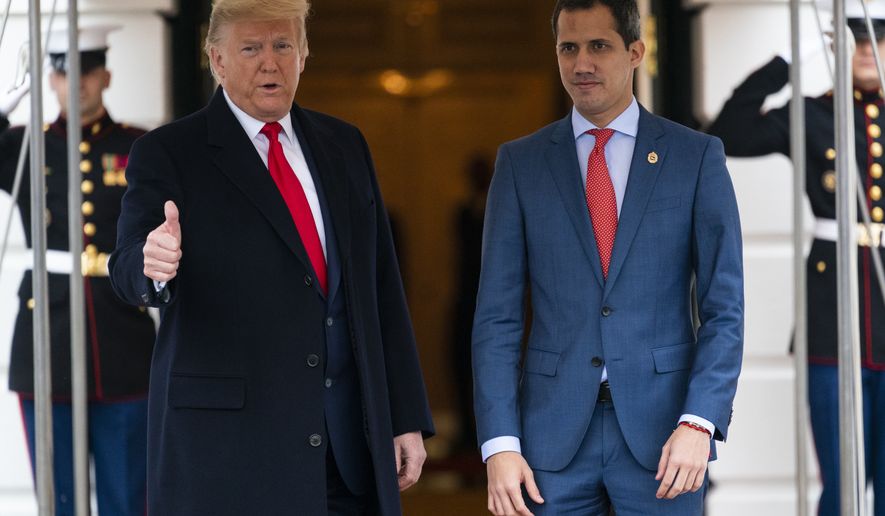President Trump gave Venezuelan opposition leader Juan Guaido a long-sought White House welcome Wednesday as administration officials promised tougher U.S. sanctions aimed at forcing socialist President Nicolas Maduro from office.
In a visit with heavy diplomatic and political overtones, Mr. Trump greeted Mr. Guaido with some of the White House ceremonial honors afforded foreign heads of state, with soldiers holding flags as they lined the driveway of the South Lawn for Mr. Guaido’s arrival. The U.S. and nearly 60 other nations recognize Mr. Guaido as the interim president of Venezuela, contending that Mr. Maduro’s reelection in 2018 was illegitimate. Mr. Guaido is finishing a tour of European and North American capitals seeking fresh momentum for his challenge to the government.
But a tightening U.S. embargo and the domestic Venezuelan opposition campaign have yet to lodge Mr. Maduro from power, with both the Venezuelan military and allies such as Russia and Cuba sticking with the regime in Caracas, despite a devastated economy and a rising humanitarian crisis.
Mr. Trump and Mr. Guaido posed for photographs and walked along the White House colonnade to the Oval Office for a meeting. But Mr. Trump canceled a scheduled joint appearance with journalists without explanation — an appearance that would have come just moments after Republican Sen. Mitt Romney of Utah became the first GOP lawmaker to announce he would vote to convict Mr. Trump in his impeachment trial on the first article.
The Oval Office meeting was a long-sought prize for Mr. Guaido and his supporters. He was a surprise guest of Mr. Trump at the State of the Union address on Tuesday night, when the president called Mr. Guaido the “true and legitimate” leader of Venezuela and members of both parties rose to applaud him.
“Mr. President, please take this message back to your homeland,” Mr. Trump said during the speech. “All Americans are united with the Venezuelan people in their righteous struggle for freedom.”
Mr. Guaido also met earlier Wednesday with Vice President Mike Pence and Florida Republican Sens. Rick Scott and Marco Rubio. Florida’s large Venezuelan American population, fiercely anti-Maduro, is likely to be a valuable prize in a critical swing state in November’s presidential election.
Mr. Maduro recently marked the one-year anniversary of Mr. Guaido’s “interim president” declaration, calling his rival “the biggest clown ever in Venezuelan or world politics.” It is unclear what kind of reception and legal challenges Mr. Guaido will face when he returns home.
Robert O’Brien, the White House national security adviser, called on Russia, China and Cuba to end their support for the Maduro government. He said Mr. Maduro, a protege of the late anti-U.S. populist President Hugo Chavez, is “exercising tyranny” over his people.
“We call on the Chinese, the Russians and the Cubans to knock it off and to get out of Venezuela and let the Venezuelans control their own destiny,” Mr. O’Brien told a group of ambassadors to the U.S. on Wednesday.
A senior administration official said Wednesday that the administration is “sending a signal to extracontinental actors that the United States will remain and should remain the partner of choice in the Western Hemisphere.”
The official said the U.S. has imposed about half of the sanctions and other tools available to pressure the Maduro regime, and that more is to come “within the next 30 days.”
“There’s a lot of tools and a lot of targets at our disposal, and we plan to use as many of them as necessary in order to fulfill our goal of an end to this dictatorship and a democratic transition in Venezuela,” the official said, adding, “We all know Nicolas Maduro is not governing Venezuela. Nicolas Maduro is surviving day by day.”
— This article is based in part on wire service reports.
• Dave Boyer can be reached at dboyer@washingtontimes.com.




Please read our comment policy before commenting.